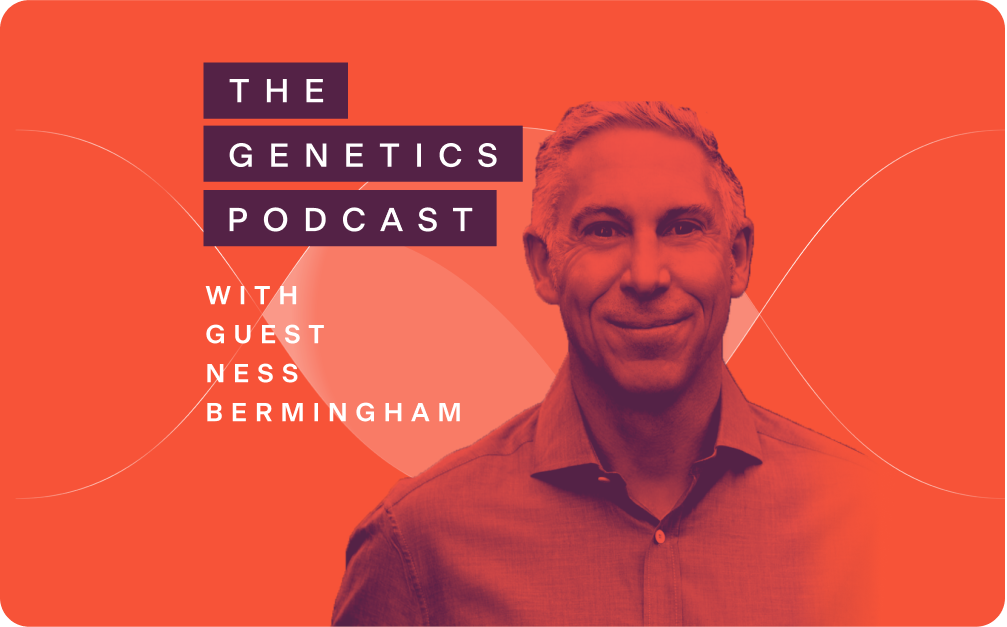Podcast recap: Dr. Ness Bermingham on biotech innovation, CRISPR, and building successful ventures

In a recent episode of The Genetics Podcast, Patrick Short hosted Dr. Nessan Bermingham, a scientist turned biotech entrepreneur and operating partner at Khosla Ventures. Dr. Bermingham has co-founded over six biotech companies, including Intellia Therapeutics and Korro Bio, and played an important role in advancing CRISPR-based genome editing and RNA editing technologies. Their conversation dove into the challenges and opportunities in biotech, from founding companies to navigating regulatory hurdles and leveraging cutting-edge science.
The early days of biotech entrepreneurship
Dr. Bermingham’s journey began in equity research on Wall Street before transitioning to venture capital at Atlas Venture in the early 2000s. His first company, Tal Medical, explored innovative solutions for major depressive disorder and PTSD. However, his career-defining moment came with the founding of Intellia Therapeutics, which spearheaded CRISPR-Cas9 technology to rapidly advance genome editing from concept to initial public offering (IPO) in under two years.
Despite the success, Dr. Bermingham highlighted the steep learning curve of building a biotech company from scratch, especially when tackling the practical challenges of turning scientific ideas into real, effective treatments.
CRISPR-Cas9: a perfect storm of opportunity
CRISPR’s meteoric rise was attributed to a convergence of scientific advances, including whole genome sequencing, population studies, and breakthroughs in nucleic acid delivery systems. These developments created the perfect environment for CRISPR-Cas9 to thrive.
Dr. Bermingham reflected on how far the technology has come, from casual Thanksgiving dinner conversations to real-world therapeutic applications. He highlighted Intellia's work on in vivo gene editing and Vertex’s CRISPR-based treatment for sickle cell disease. “Seeing the idea of a one-and-done treatment become a reality,” he said, “is both humbling and incredibly inspiring.”
Korro Bio and the potential of RNA editing
Dr. Bermingham also shared the story behind Korro Bio, a company dedicated to RNA editing using the ADAR system. Unlike CRISPR’s permanent DNA edits, RNA editing provides a reversible and adjustable approach, making it suitable for a broader range of diseases. Korro’s pipeline highlights the kind of innovation required to stand out in a competitive biotech field, tackling complex conditions like alpha-1 antitrypsin deficiency by targeting both liver and lung issues simultaneously.
Navigating biotech’s unique challenges
Dr. Bermingham explained that building a successful biotech venture requires more than just scientific breakthroughs. It involves navigating capital constraints, scaling teams, and managing market volatility. Timing is critical, particularly when it comes to public market debuts, where many companies falter due to premature IPOs. “It’s about having a five-to-ten-year vision and adapting as new data comes in,” he said.
Regulatory and economic hurdles in personalized medicine
The conversation turned to one of Bermingham’s most ambitious ventures, EveryONE Medicines, which seeks to pioneer truly personalized medicine. He described the hurdles in creating a regulatory framework for N-of-1 therapies, where each drug is tailored to an individual patient’s genetic makeup. Drawing parallels to CAR-T therapy approvals, he advocated for more flexible regulations to bring personalized nucleic acid drugs to patients.
The role of AI in biotech
While optimistic about AI’s potential to accelerate drug discovery, Dr. Bermingham acknowledged its current limitations. The shortage of high-quality training data and the complexity of biological systems mean AI is more likely to bring gradual improvements rather than big breakthroughs in the near future. However, he emphasized that learning from failures and bridging the gap between AI and real-world drug discovery expertise are essential to unlocking its future potential.
A Vision for the Future
Despite frustrations with the current biotech funding environment, Dr. Bermingham remains optimistic about the industry’s long-term prospects. He believes that the convergence of advances in CRISPR, RNA editing, and AI will eventually revolutionize drug development and improve patient care. His advice for future biotech leaders? Be intentional in your work, embrace failure as an opportunity to learn, and stay focused on solving big, meaningful challenges.
Listen now:
